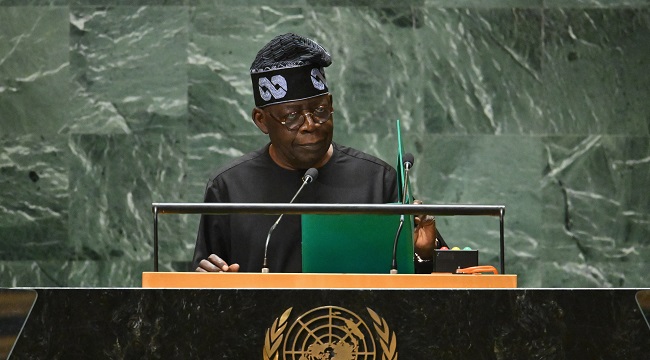Africa Holds the Key to the World’s Future: In his debut address before the United Nations General Assembly, President Bola Ahmed Tinubu of Nigeria delivered a passionate speech, highlighting the urgent need for global solidarity and cooperation to address the challenges facing Africa. President Tinubu underscored the significance of this year’s theme, emphasizing that while internal governance failures have hindered Africa’s progress, external factors such as broken promises, unfair treatment, and exploitation have also played a detrimental role. He called for a unique approach to African development, reminiscent of the Marshall Plan that helped post-war Europe rebuild.
President Tinubu underscored the significance of this year’s theme, emphasizing that while internal governance failures have hindered Africa’s progress, external factors such as broken promises, unfair treatment, and exploitation have also played a detrimental role. He called for a unique approach to African development, reminiscent of the Marshall Plan that helped post-war Europe rebuild.
Key points from President Tinubu’s address:
1. Economic Restructuring: Tinubu stressed the need for international actors to prioritize African development, acknowledging that economic structures in Nigeria and Africa have impeded growth, job creation, and wealth distribution. He highlighted ongoing reforms in Nigeria, including the removal of the fuel subsidy, and invited partnerships that promote mutual benefits.
2. Democratic Governance: President Tinubu firmly supported democratic governance as the best way to ensure the sovereign will and well-being of African people. He denounced military coups and tilted civilian political arrangements, calling for solutions to longstanding problems in the region.
3. Combating Extremism: Tinubu discussed the ongoing battle against violent extremists in the region and the illicit commerce that fuels their activities. He emphasized the importance of international commitment to curbing arms flows into West Africa and disbanding extremist groups.
4. Resource Protection: The President highlighted the need to secure mineral-rich areas from exploitation and conflict, mentioning the Democratic Republic of the Congo and other affected regions. He called for collaboration to prevent the pillaging of Africa’s resources.
5. Climate Change: Tinubu recognized the severe impact of climate change on Nigeria and Africa, from desert encroachment to coastal flooding. He emphasized the importance of addressing climate change in conjunction with economic development and outlined initiatives to build political consensus.
In conclusion, President Tinubu reiterated Nigeria’s commitment to peace, security, human rights, and development, aligning with the principles of the United Nations. He called for an end to poverty, resource exploitation, and the protection of the planet. President Tinubu’s address was a passionate call for global partnership, highlighting Africa’s potential as the key to the world’s future.
As the world grapples with complex challenges, President Tinubu’s message resonates as a plea for unity, cooperation, and a brighter future for Africa and the global community. His vision underscores the importance of addressing the unique needs and potential of the African continent in the pursuit of a better world for all.
